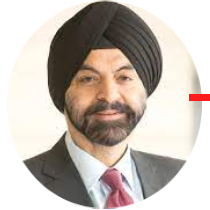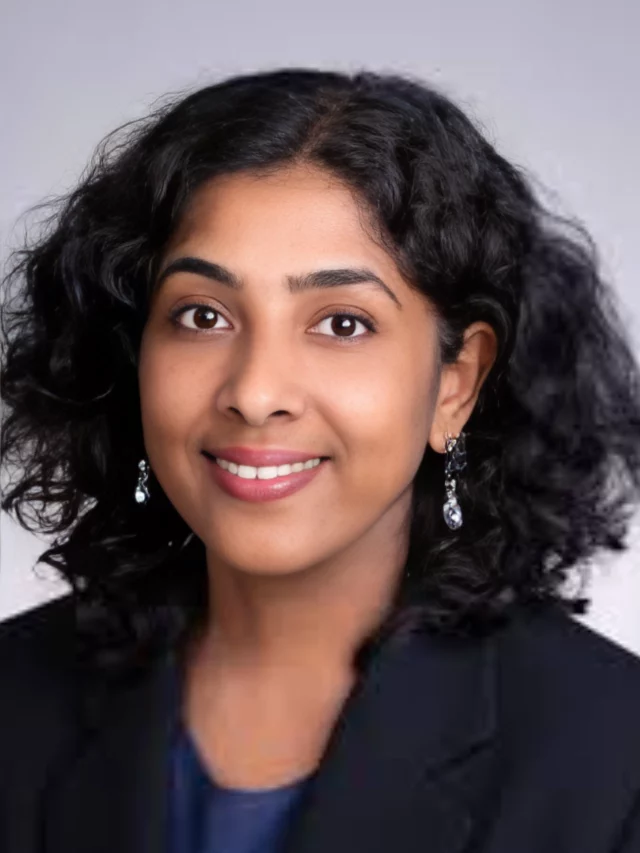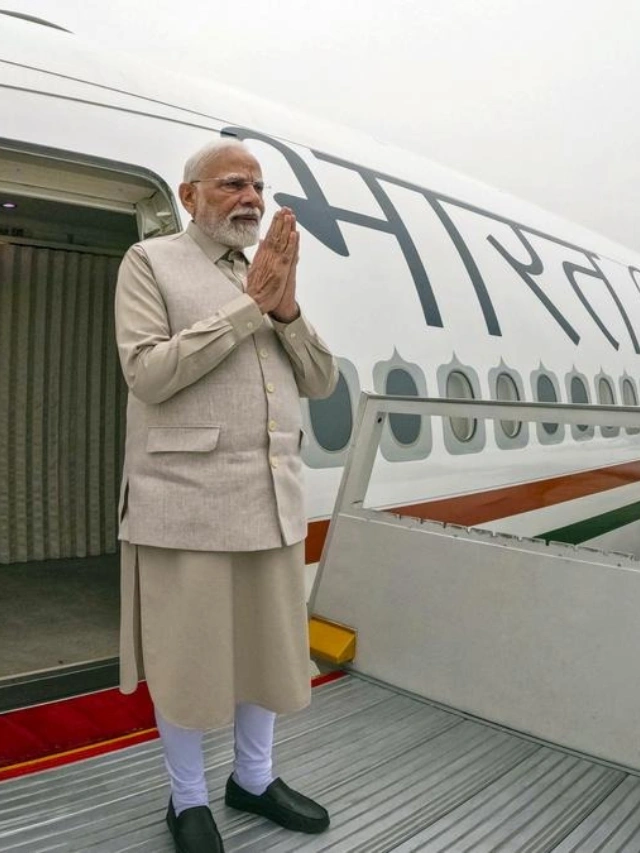Ajay Banga
Ajay Banga became the first person of South Asian ancestry to lead the World Bank after his election as President on May 3, 2023. The Joe Biden administration nominated him in February 2023, and he started his five-year term in June 2023. This appointment stands as one of the most important milestones in global financial leadership.
Ajay Banga’s impressive tenure as Mastercard’s CEO from July 2010 to December 2020 brought remarkable changes to the business. His leadership helped triple the company’s revenue and increased net income sixfold. The market capitalization grew from under $30 billion to more than $360 billion. On top of that, he created the Center for Inclusive Growth to advance equitable economic growth and financial inclusion worldwide.
CEO’s | Actors | Politicians | Sports Stars
Ajay Banga’s main goal at the World Bank centers on guiding the institution toward growth and development that directly affects poverty alleviation and climate change. He plans to make inclusion a key part of his leadership strategy and bring the private sector on board to support the World Bank’s work. This piece tells the story of his remarkable trip from India to leading one of the world’s most influential financial institutions.

Early Life and Education of Ajay Banga
Family background and upbringing
Punjabi Sikh Roots: Ajaypal Singh Banga was born on November 10, 1959, in Khadki, a small town in Maharashtra, India. His family’s roots go back to Jalandhar, Punjab, where they belonged to the Saini Sikh community. His father’s role as a lieutenant-general in the Indian Army shaped much of Ajay’s early years.
Military Family Life: Ajay Banga’s childhood was unique. His family moved around India because of his father’s military postings. This lifestyle gave him a chance to experience India’s rich cultural diversity at a young age and helped build his global viewpoint. He grew up with his older brother M.S. Banga, who later became a successful businessman.
Ajay Banga’s education in India
Prestigious Schooling: Banga studied at some of India’s best schools. He started at St. Edward’s School in Shimla, nestled in the beautiful Milsington Estate of Himachal Pradesh. He then went to Hyderabad Public School in Begumpet, Hyderabad.
Elite College Experience: St. Stephen’s College, one of India’s top undergraduate institutions in Delhi University, became Banga’s next stop. He showed his academic talent there and earned his Bachelor of Arts (honors) in Economics in 1981.
Ajay Banga’s qualification and early influences
Management Education: Banga’s next step was the Post Graduate Program (PGP) in Management at the Indian Institute of Management, Ahmedabad (IIMA). This MBA-equivalent program gave him strong business and management skills. He graduated from IIMA in 1981 and joined its notable alumni network.
Academic Excellence: Banga stood out as a brilliant student throughout his education. His outstanding academic performance earned him several awards and scholarships. These early achievements pointed to his future success in the corporate world.
Formative Influences: His unique background combined military family life, exposure to India’s diversity, and education from top institutions. These experiences shaped his leadership style and worldview. His life took another turn when he became a US citizen in 2007, showing his growing global mindset.
Early Career Direction: Nestlé India became Banga’s first workplace in 1981, where he spent 13 years. This sales and marketing role laid the groundwork for what would become an amazing global career across industries and continents.
Corporate Career: From Nestlé to Mastercard
Starting at Nestlé: Sales and marketing roots
Early Professional Journey: Ajay Banga started his corporate career as a management trainee at Nestlé India in 1981 after completing his postgraduate degree at the Indian Institute of Management. He spent the next 13 years building his expertise in sales, marketing, and general management roles. This period became significant in developing his business acumen and leadership capabilities. His time at Nestlé gave him ground experience in consumer goods marketing and product launches in India’s market.
PepsiCo and the liberalization era
Market Liberalization Pioneer: Banga left Nestlé in 1994 and joined PepsiCo as head of marketing for its snacks division in India. His arrival coincided with a defining moment in India’s economic history—the liberalization era that welcomed global businesses. He played a key role in launching PepsiCo’s international fast food franchises, including Pizza Hut and KFC, in India. This experience taught him how to navigate emerging markets during economic transformation.
Citigroup years and global exposure
Global Banking Trajectory: Banga made a strategic move to Citigroup in 1996, where he would spend 13 years rising through the ranks. His Citigroup journey began humbly—he worked briefly as a debt collector during training. He quickly rose to lead CitiFinancial and the US Consumer Assets Division from 2000 to 2002. His role expanded to lead Citi’s International Global Consumer Group from 2005 to 2008, where he oversaw credit card and consumer banking operations outside North America.
Asian Leadership: Banga became CEO for Citigroup Asia Pacific in 2008 before joining Mastercard. He arranged a major reorganization of Citigroup’s Asian operations that enabled regional heads with increased authority across product lines. The global financial crisis created challenges, yet he earned about $10 million in compensation from Citigroup in 2008, making him one of the firm’s highest-paid executives that year.
Mastercard CEO Ajay Banga: A decade of transformation
Payment Evolution Champion: Banga left Citigroup to become Mastercard’s Chief Operating Officer in 2009. He became President and CEO by July 2010, starting what would become an exceptional decade of leadership. Under his guidance, Mastercard transformed dramatically:
- Tripled company revenues
- Increased net income sixfold
- Grew market capitalization from under $30 billion to more than $360 billion
Strategic Vision: Banga’s leadership took the company beyond traditional credit card services. By his tenure’s end, analytics, cybersecurity, data, and AI generated one-third of Mastercard’s revenue—business segments that barely existed when he started. His vision of a “world beyond cash” became a guiding principle that struck a chord throughout his 12-year leadership.
Ajay Banga’s net worth and compensation
Compensation Package: Banga’s Mastercard success reflected in his substantial compensation. His annual salary package reached approximately ₹196 crore ($23.5 million), about ₹52 lakh ($62,500) per day. His first year as CEO brought him ₹113.9 crore ($13.7 million) in compensation.
Personal Wealth: Banga’s net worth reached around ₹1,738 crore ($208 million) by July 2021. Much of his wealth came from Mastercard stocks, valued at approximately ₹954 crore ($114 million). His leadership at Mastercard ended with his move to Executive Chairman in January 2021, before he retired fully from the company on December 31, 2021.
Driving Financial Inclusion and Innovation
Bringing 500 million unbanked into the system
Financial Inclusion Pioneer: Ajay Banga led a game-changing mission at Mastercard that became his lasting legacy. He aimed to bring 500 million people without bank accounts into the formal banking system and digital economy by 2021. His deep belief in financial access showed in his famous words: “The Internet of Everything won’t work without the inclusion of everyone”.
Global Financial Access: Banga teamed up with the World Bank Group to reach these 500 million people who lacked financial services. The Biden administration noted these achievements when they picked him for the World Bank presidency. His mission gained extra momentum as the pandemic sped up digital adoption worldwide.
Current Progress: Banga’s efforts paid off remarkably well. The 2025 Global Findex Report shows that adults with bank accounts worldwide jumped from about 50% in 2011 to nearly 80% today. Now as World Bank president, Banga points out: “Financial inclusion has the potential to improve lives and transform entire economies”.
Biometric banking in South Africa
Biometric Innovation: Mastercard launched debit cards with built-in biometric data in South Africa under Banga’s watch. This breakthrough helped solve a key challenge – giving secure banking services to people without standard ID documents.
Social Grant System: The team set up a biometric payment system to handle state pensions and social grants more smoothly. This project marked one of the first major rollouts of biometric financial technology for underserved communities.
Technology Development: The South African project gave Mastercard valuable insights into biometric authentication. The company later started testing biometric credit cards for middle-class customers and launched its first card in South Africa in 2017.
Digital transformation at Mastercard
Beyond Cash Vision: Banga consistently pushed for a “world beyond cash” during his time at Mastercard. His plans went way beyond payment processing to create a detailed digital financial system.
Financial Performance: This strategy turned into a soaring win. During his 11 years as president and chief executive, Mastercard’s revenues tripled, net income grew six times, and its market value rose from below ₹2,531.41 billion to more than ₹25,314.14 billion.
Inclusive Digital Economy: Banga built digital marketplaces that “embedding inclusion by design, ensuring commercial viability and creating an environment where everyone has an opportunity to grow and thrive”. He made sure digital financial services reached overlooked communities while staying profitable.
Sustainability and the Priceless Planet Coalition
Environmental Leadership: Banga kicked off the Priceless Planet Coalition in January 2020, bringing together corporate sustainability efforts across industries. This move expanded Mastercard’s role beyond financial inclusion into environmental action.
Ambitious Goal: The coalition set out to plant 100 million trees in five years. Banga brought major players on board including Citibank, Santander UK, IHS Markit, Saks Fifth Avenue, and transport authorities in London and New York.
Climate Action Philosophy: Banga expressed his environmental focus clearly: “No matter who you are or what you do, climate change affects you. But, it has the biggest negative effect on those who are socially and economically vulnerable”. Later at his World Bank confirmation, he stressed how “inequality is intertwined completely with challenges like climate change”, showing his all-encompassing approach to sustainable growth.
Public Sector and Global Leadership
Advisory roles under Obama and Biden
Presidential Appointment: President Barack Obama recognized Banga’s expertise and appointed him to the President’s Advisory Committee for Trade Policy and Negotiations in February 2015. Banga helped shape America’s trade policies while leading his corporate responsibilities.
Biden Administration Advisor: Banga became an outside adviser to Vice President Kamala Harris after the 2020 elections. He guided the administration’s work in El Salvador, Guatemala, and Honduras, which showed his growing role in international development policy.
Chairing the Partnership for Central America
Strategic Leadership: Banga led the Partnership for Central America (PCA) as Co-Chair. The coalition brought private organizations together to create economic chances in El Salvador, Guatemala, and Honduras. This alliance between public and private sectors started in May 2021 and tackled migration’s economic causes through job creation and social programs.
Meaningful Results: Banga and his co-chair Blanca Trevino’s leadership drew private sector commitments worth more than INR 270.02 billion for development projects. His collaboration with Vice President Harris proved his skill at bringing private capital to serve public needs.
Ajay Banga World Bank nomination and confirmation
Presidential Nomination: President Biden nominated Ajay Banga to lead the World Bank on February 23, 2023. David Malpass, the previous president from the Trump administration, had announced his early departure almost a year ahead of schedule.
Selection Rationale: Biden’s team highlighted Banga’s unique experience in running large organizations and his deep knowledge of the digital economy. President Biden said, “Ajay is uniquely equipped to lead the World Bank at this critical moment in history”. Banga’s skill at gathering resources to address urgent challenges like climate change made him stand out.
World Bank president Ajay Banga: First South Asian leader
Historic Confirmation: The World Bank’s executive directors chose Ajay Banga as their 14th President on May 3, 2023, for a five-year term starting June 2, 2023. He became the first person of South Asian ancestry to reach this prestigious position.
Transformational Mandate: Banga stepped into leadership with a clear goal to reshape the 80-year-old institution. The World Bank needed to become faster, more efficient, and more meaningful in development partnerships. He focused on increasing lending capacity, making operations simpler, and making use of private sector resources to tackle global challenges like climate change and poverty.
Ajay Banga’s Broader Impact and Recognition
Ajay Banga family and personal life
Family Bonds: Ajay Banga met his wife Ritu while they studied at the Indian Institute of Management Ahmedabad. They tied the knot right after graduation and stayed together as his career took them around the world. Ritu made her own mark by co-founding Zoomdojo, a career advisory service that helps students find professional opportunities.
Cultural Roots: Banga’s Sikh heritage remains central to his identity. He became an American citizen in 2007 but still wears his turban proudly as a symbol of his faith and culture. His success at blending traditional values with global business leadership has become his signature trait.
Ajay Banga daughter and children’s achievements
Next Generation: The Bangas’ daughter, Jojo, carved her own unique path away from finance. She graduated from top schools and chose to work in creative fields instead of following her father’s footsteps into banking or corporate leadership.
Private Approach: Banga stands out from other business leaders by keeping his family life private. This choice let his daughter grow into her own person without her father’s financial world reputation overshadowing her.
Awards and honors: Padma Shri, Time100, Carnegie
National Recognition: The Indian government honored Banga with the Padma Shri in 2016. This prestigious civilian award acknowledged his work in business and Indo-US relations. Time magazine also named him among their “100 Most Influential People,” showing his global impact beyond just business success.
Industry Accolades: Banga’s trophy cabinet includes the Foreign Policy Association Medal, the Ellis Island Medal of Honor, and the Carnegie Corporation’s “Great Immigrant” recognition. These awards show how he shaped business, philanthropy, and international relations.
Ajay Banga’s leadership philosophy
Inclusive Vision: Banga believes business must tackle society’s challenges while delivering shareholder value. “The purpose of a business is to serve society,” he often says. This motto shows his belief that companies should make money and make a difference.
Pragmatic Approach: Banga supports what he calls “constructive disruption” – finding new ways to solve old problems. He now leads the World Bank with this mindset, bringing private money into development projects and fighting climate change. His mix of big dreams and practical solutions makes him stand out as a global leader.
Key Takeaways
Ajay Banga’s journey from India to leading the World Bank demonstrates how strategic career moves, inclusive leadership, and global vision can create transformational impact across industries and continents.
- Banga made history as the first South Asian to lead the World Bank, bringing extensive private sector experience to tackle global poverty and climate challenges.
- During his Mastercard tenure, he tripled revenues and brought 500 million unbanked people into the formal financial system through innovative digital solutions.
- His leadership philosophy centers on “constructive disruption” – challenging established practices while building practical solutions that serve both business and society.
- Strategic career transitions from Nestlé to PepsiCo to Citigroup to Mastercard provided diverse experience across consumer goods, emerging markets, and global finance.
- Beyond corporate success, Banga launched the Priceless Planet Coalition and advised multiple US administrations, demonstrating commitment to environmental sustainability and public service.
Banga’s remarkable trajectory illustrates how combining business acumen with social purpose can drive meaningful change at a global scale, making him uniquely positioned to transform international development finance.
Also Read: Journey of Sanjeev Sanyal, CK Prahalad
FAQ
What is Ajay Banga's educational background?
Ajay Banga completed his schooling at St. Edward’s School in Shimla and Hyderabad Public School in Begumpet. He pursued a Bachelor of Arts (Honors) in Economics from St. Stephen’s College, University of Delhi. Later, he completed his Post Graduate Program in Management (MBA equivalent) from the Indian Institute of Management, Ahmedabad. His strong educational foundation played a crucial role in shaping his career, enabling him to hold top executive positions in multinational corporations like Mastercard and eventually leading to his appointment as the President of the World Bank in 2023.
What is Ajay Banga's net worth?
Ajay Banga’s net worth is estimated to be between $143 million and $1.2 billion, according to various reports. As a former CEO of Mastercard, he accumulated significant wealth through salary, stock options, and bonuses. His leadership helped Mastercard grow into a global financial powerhouse. After stepping down as CEO, he served as Vice Chairman at General Atlantic before becoming the President of the World Bank. His vast experience in the financial sector, combined with strategic investments and leadership roles, has contributed significantly to his financial success over the years.
Who is Ajay Banga's wife?
Ajay Banga is married to Ritu Banga. She has been a strong supporter of his professional journey and has co-founded Zoomdojo, a social enterprise focused on career development. The couple has two children, a daughter named Aditi and a son named Jojo. Despite his high-profile career, Banga keeps his personal life private. He has often credited his wife and family for being a pillar of support throughout his career, especially during his transition from leading corporate roles to becoming the President of the World Bank in 2023.
Who are the members of Ajay Banga's family?
Ajay Banga was born into a Punjabi Sikh family on November 10, 1959, in Pune, India. His father, Harbhajan Singh Banga, was a retired lieutenant-general in the Indian Army. His elder brother, M.S. Banga, is a prominent business executive. Ajay Banga is married to Ritu Banga, and they have two children, Aditi and Jojo. His family background in leadership and discipline played a significant role in shaping his career, allowing him to excel in the financial sector and ultimately become the President of the World Bank in 2023.
How old is Ajay Banga?
Ajay Banga was born on November 10, 1959, making him 65 years old as of 2025. Over the past four decades, he has built a remarkable career in finance and business leadership. His journey includes holding top positions at major corporations such as Nestlé, PepsiCo, Citigroup, and Mastercard. Despite his age, Banga remains active in global financial leadership, serving as the 14th President of the World Bank since June 2023. His extensive experience and strategic vision continue to shape global financial policies and drive economic development worldwide.
What were Ajay Banga's roles at Mastercard?
Ajay Banga served as President and CEO of Mastercard from July 2010 to December 2020. Under his leadership, Mastercard’s revenue tripled, and its market capitalization grew from under $30 billion to over $360 billion. He spearheaded initiatives like the Center for Inclusive Growth, promoting financial inclusion and digital payments worldwide. Banga’s leadership transformed Mastercard into a leader in digital transactions and innovation. After stepping down, he became Executive Chairman of Mastercard until 2021, before transitioning to a role at General Atlantic and later becoming President of the World Bank in 2023.
When did Ajay Banga become the President of the World Bank?
Ajay Banga assumed office as the 14th President of the World Bank Group on June 2, 2023, for a five-year term. He was nominated by U.S. President Joe Biden and was the sole candidate for the position. With decades of experience in finance and economic development, Banga was chosen to lead the World Bank in addressing global financial challenges, including poverty reduction and climate change. His leadership aims to enhance global economic stability and drive investment in emerging markets, furthering the World Bank’s mission of fostering sustainable development worldwide.
What is Ajay Banga's salary as President of the World Bank?
Ajay Banga’s exact salary as the World Bank President has not been publicly disclosed, but estimates suggest it exceeds $550,000 per year. This compensation includes additional benefits such as housing allowances, travel expenses, and performance-based incentives. His salary reflects the responsibilities of overseeing financial aid, economic policies, and development projects across various nations. Before joining the World Bank, he earned significantly more as Mastercard’s CEO, where he made over $27 million annually in salary, bonuses, and stock options. Despite the pay cut, Banga took the role to focus on global economic growth and sustainability.




